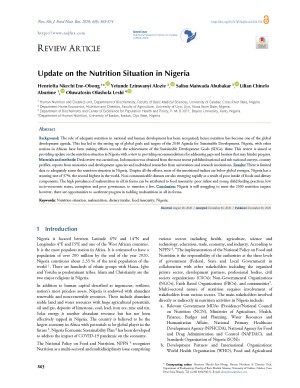Update of the Nutrition Situation in Nigeria
Abstract
Background: The role of adequate nutrition in national and human development has been recognized; hence nutrition has become one of the global development agenda. This has led to the setting up of global goals and targets of the 2030 Agenda for Sustainable Development. Nigeria, with other nations in African have been making efforts towards the achievement of the Sustainable Development Goals (SDGs). Aim: This review is aimed at providing update on the nutrition situation in Nigeria with a view to providing recommendations for addressing gaps and barriers that may hinder progress. Materials and methods: Desk review was carried out. Information was obtained from the most recent published national and sub-national surveys, country profiles, reports from ministries and development agencies and individual researches from universities and research institutions. Results: There is limited data to adequately assess the nutrition situation in Nigeria. Despite all the efforts, most of the nutritional indices are below global averages. Nigeria has a stunting rate of 37%, the second highest in the world. Non-communicable diseases are also emerging rapidly as a result of poor intake of foods and dietary components. The high prevalence of malnutrition in all its forms can be attributed to food insecurity, poor infant and young child feeding practices, low socio-economic status, corruption and poor governance, to mention a few. Conclusion: Nigeria is still struggling to meet the 2030 nutrition targets; however, there are opportunities to accelerate progress in tackling malnutrition in all its forms.
Full text article
Authors
Copyright (c) 2020 Authors

This work is licensed under a Creative Commons Attribution 4.0 International License.
-
Attribution — You must give appropriate credit, provide a link to the license, and indicate if changes were made. You may do so in any reasonable manner, but not in any way that suggests the licensor endorses you or your use.
-
No additional restrictions — You may not apply legal terms or technological measures that legally restrict others from doing anything the license permits.





